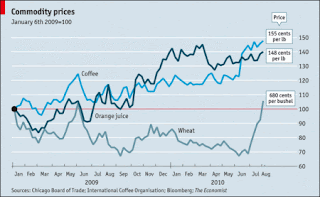Did Global Warming Cause the Arab Riots?
It’s no secret rising food and commodity prices have driven people in poor countries to desperation. Dictators in place for thirty years are finally falling after a combination of missteps. Following years of corruption and mismanagement, crumbling financial security is prompting traditional powers to eliminate costly subsidies on food and oil. All the while, commodity prices are rising with the depletion of crops due to floods and droughts. Reaching a tipping point with exorbitantly high prices for basic goods, desperate people are fighting back against the status quo.
 |
| Nobel Prize Winning Economist Paul Krugman |
Last month I discussed how rising food prices contributed to the riots in Tunisia, in Egypt, and in Bolivia. I also explained how Iran successfully managed (at least for the time being) to divert attention away from the rising costs of basic goods. Today Paul Krugman (the Nobel Prize winning economist and movie star extraordinaire in Get Him to the Greek) went one step further. He asserted that global warming caused the recent unrest.
Most economists cite a number of factors contributing to rising commodity prices. Commodities began their steep rise with the 2008 boom coinciding precisely with the stock market’s collapse. The financial crisis made government issued currencies less stable, thus commodities became coveted assets. Around that same time, a large shift in investment directed capital towards emerging economies: Brazil, Russia, India, and China. BRIC nations’ growth increased global demand for commodities as the countries became progressively wealthy and their purchasing power swelled. And with recent floods and droughts, extreme weather destroyed crops in some of the biggest food producing nations, cutting world food supply and driving up prices.
 |
| Up until July, food prices were dipping while other commodities were on the rise. |
Krugman’s assertion is that popular rationales relating to the financial crisis and the emergence of BRIC economies are misguided. Changes in wealth don’t affect the amount of food people eat (with the exception of extremely poor countries, ie, not BRIC nations, and with the other exception of meat consumption, ie, not wheat, corn, rice, or other grains). Also, food prices, in relation to other non-food commodities, have grown slower than their counterparts from September 2008 to Summer 2010. Petroleum products and precious metals witnessed steeper price rises than those of food experienced, which would indicate that food prices, relative to others, have not grown as fast as an economic crisis trigger would suggest. The graph on the left shows 2010 commodity prices, with food well below the average in the first half of the year.
Krugman’s argument stems from the sudden rise of food prices in July 2010. Russia, the world’s third biggest wheat exports, sold 63.7 million metric tons in international markets in 2009. This past summer, Russia experienced 100˚F temperatures for the first time in Moscow’s history. In response to arid droughts, grain production in the former USSR dropped almost 40%. China, the world’s largest producer of wheat, is “bracing for its worst drought in 200 years”. This year, 12.75 million acres, or 37%, of its wheat fields have already been destroyed. For the first time in the Communist Regime, China might have to import wheat from international markets. Australia, Canada, India, and Brazil were all plagued with floods, contributing to the total wipeout of 20 million tons of global wheat production per month. Accordingly, world food and commodity prices keep steadily rising.
 |
| Wheat prices skyrocketed in July 2010, just as Russia’s drought began. |
Diversified world production (with crops grown on many different continents) and disaster-ready stockpile reserves all account for normal weather afflictions like isolated droughts or small river-caused floods. Isolated cases, like the 2004 Indian Ocean tsunami, can stand alone. But patterns of extreme weather, such as those in 2010, suggest a global trend. 2010 was the hottest year on Earth. According to the National Oceanic and Atmospheric Administration, Earth’s temperature rose 1.22˚F higher than normal. 20% of the world’s landmass reached record high temperatures! As Krugman notes, “both droughts and floods are natural consequences of a warming world: droughts because it’s hotter, floods because warm oceans release more water vapor.” Droughts and floods kill crops and whither world food supply. This new wave of extreme weather pushes commodity prices higher than ever.
Even though the current unrest is not as singly focused on global warming as Dr. Krugman suggests, extreme weather is driving up food and commodity prices to record highs. Poor, hungry people in Tunisia and Egypt desperately fight against rising food prices. Despite their lack of familiarity with the intricate workings of commodity exchanges, people taking to the streets directly feel the effects of expensive food in their wallets and stomachs.
Resistant business interests provide powerful lobbies against structural change driven by Global Warming environmental regulation. They wholeheartedly attack the merits of climate change. But when the status quo gets shaken with political upheaval, businesses, politicians, and the general public all take notice. At this point, the new order in the Middle East might not be directly tied to climate change. However, if food driven riots continue to manifest, food security will soon become too big a problem to ignore.

0 comments:
Post a Comment